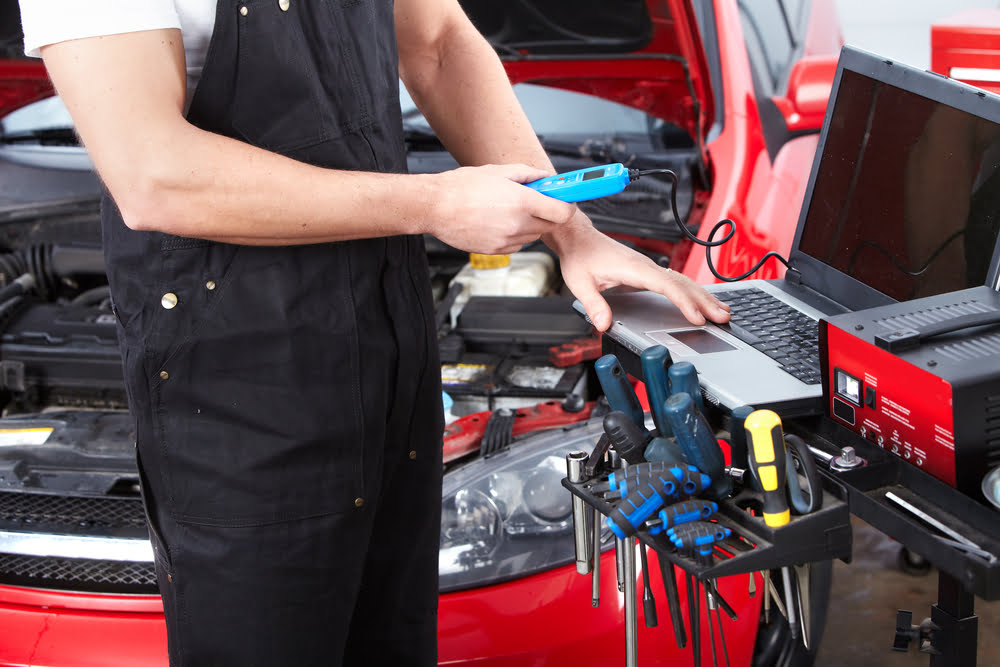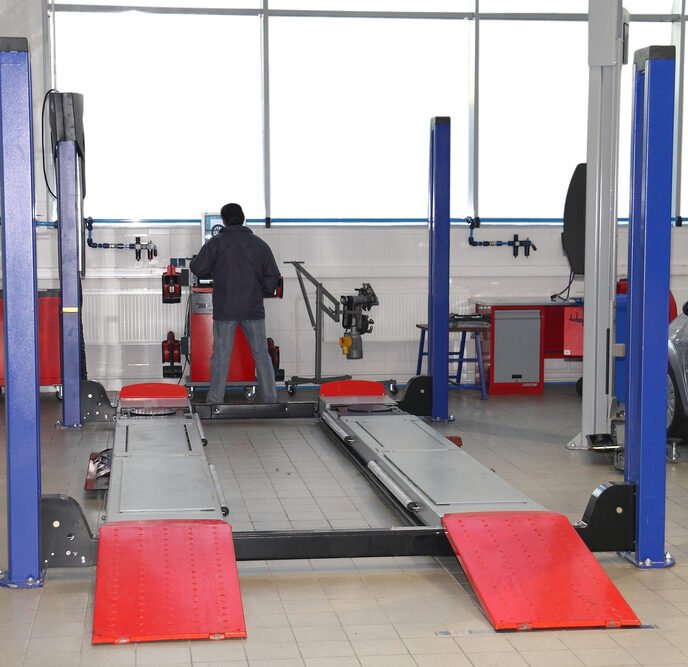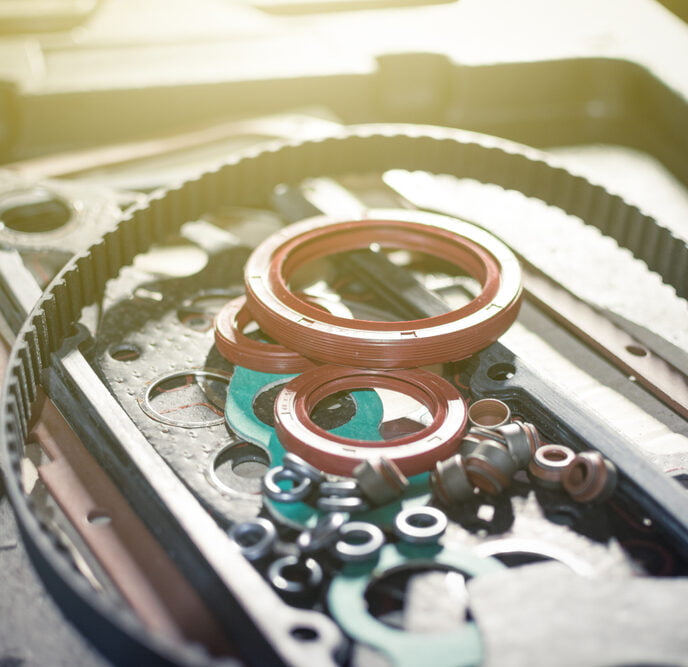16 Essential Auto Repair Shop Equipment List

Choosing the right equipment for your auto shop can spell the difference between a successful business and one that struggles to scrape by. You need to know not only which equipment is most important but also where, when, and how to buy it in order to get your business started on the right foot.
When to Start Purchasing Equipment for Your Auto Shop
It’s a good idea to make an auto repair shop equipment list before you open your shop. Don’t buy things “just in case” but do buy every single item you’ll need for the services you intend to provide. Shopping in advance enables you to provide the best possible service to new customers. It also helps you save money as you can take the time to find good deals and special offers.
New vs Used Equipment for Your Auto Repair Shop
When you buy new equipment, you’ll know beyond a shadow of a doubt that it will work well. Plus, you’ll have warranty coverage if something goes wrong. However, purchasing all-new tools and equipment can be a huge expense for any new business, which is why many new auto shops purchase at least some items used. If you plan on going this route, you’ll want to choose a seller with care and thoroughly inspect each piece of equipment to make sure it’s in good working order.
1. Tire Changers
A tire changer is one of the most important pieces of equipment for any new auto shop. Take some time to consider the options before picking that one that best meets your needs. You’ll also want to make sure you have a reliable parts supplier to keep your changer in good working order at all times.
2. Transmission Jack
While it’s important to have basic floor jacks, at times something more robust is necessary. If you plan on offering services where you will need to support large transmissions, consider purchasing a transmission jack. You should be able to find several additional uses for a transmission jack, as having it around will come in handy anytime you need to hoist something heavy.
3. Wheel Alignment Machine
Wheel alignment is an important, in-demand service that can significantly increase your revenue stream. To choose the right machine for the job, consider your floor space, flexibility of the model in question, and the pros and cons of choosing a computerized machine.
4. Hydraulic Press
If you’re in need of crushing or bending metal material, look into the expensive, but useful hydraulic press. With this, you can separate rusted parts and straighten bent metal, which can really speed up certain repairs.
5. Air Compressor
Air compressors are pneumatic systems that convert power into pressurized (compressed) air. An air compressor is necessary to operate many other essential tools around the shop, so choosing a reliable, powerful air compressor is important. It can help clean dust and dirt behind engine blocks with its pressurized air. In addition, a quality air compressor helps clean many mechanical parts, such as behind the fissures inside rotors.
A high-quality air compressor also allows you to operate many tools in your shop, such as air ratchets, airbrushes, sandblasters, paint sprayers, air saws, and sanders. Lastly, garages with tire inflating tools can’t function without air compressors. Air compressors generate air pressure, which helps to inflate tires. Choosing a suitable air compressor can improve your productivity.
Get the highest capacity you can afford to be sure you have the power you need for powering your shop’s needs. For many auto shops, a 60 or 120-gallon compressor is sufficient.
6. A/C Machine
An A/C machine will allow you to service A/C units. The demand for this service is especially prevalent in warmer months. Look for a system that will recover, recycle, and recharge air conditioning systems.
Having an air conditioning machine in your shop will make flushing and diagnosing air conditioning systems quicker and more reliable.
Of course, skip this purchase if you don’t plan to offer A/C servicing.
7. Jacks and Jack Stands
Jacks and jack stands are used to temporarily lift a vehicle off the ground to complete repairs. In many auto repair shops, floor jacks are regularly utilized. Like your air compressor, this purchase is one of the most important.
Floor jacks come in various sizes with differing capabilities. A 2-ton jack is sufficient for simple jobs; however, purchasing a larger jack isn’t a bad idea. The ideal capacity should reach about seventy-five percent of the vehicle’s overall weight. Weight ratings are usually found on a driver’s side doorjamb sticker.
The most common car jacks are the scissor, floor, screw, bottle, and farm jack. We recommend buying a high-quality, highly-recommended jack system that can accommodate vehicles of various sizes.
8. Digital Vehicle Inspection Technology
Though not absolutely necessary, purchasing a system that can run a thorough diagnostic on a customers’ vehicle will give your auto shop an automatic edge among your competition. The tool is helpful for your technicians and can assist in customer relations. A straightforward inspection report can help explain why a certain repair is needed.
9. Oil Drain/ Oil Caddy
Changing oil or transmission fluid – among the most common auto shop services – requires an oil caddy. Oil caddies are available in a variety of fluid volume capacities. To choose the best option for your shop, determine the largest fluid volume you anticipate handling. For example, do you plan to work on RVs or SUVs? Purchase a caddy to meet this capacity.
To increase efficiency, consider buying a standing oil caddy. A standing caddy can be utilized when a vehicle is on a lift, allowing you to complete additional repairs while the oil is draining. Though a standing caddy is not a must-have, it certainly optimizes oil and transmission fluid changes.
10. Oxygen-Acetylene Torch
If you service an area with a lot of environmental moisture, you can expect customers to come in with rusty vehicles. An oxygen-acetylene torch is used to fix rust issues efficiently. In drier areas, this piece of equipment is not vital.
11. Press
There are many reasons for using a press in your automotive repair shop, including separating rusted parts, straightening bent parts, and compressing used oil filters.
However, having access to a press in your shop will give you much more.
A press has a dozen uses in the auto shop. Made to deform workpieces under high pressure, a shop press is often used to press parts together, such as fitting bearings into housings. Presses can be purchased with between 1 and 30 tons of pressure. For an auto shop, a 30-ton press is ideal.
12. Brake Lathe
As the name implies, brake lathes are designed to effectively and efficiently service brakes. Another one of the most common reasons a customer may come to your auto shop.
When doing brake jobs, it lowers your shop’s productivity if you have to take drums or rotors to another service to resurface. Buying a brake lathe for your shop will make brake services more efficient and profitable, so the investment quickly pays for itself.
Be sure to purchase a high-quality name-brand lathe to ensure the availability of replacement parts when needed.
Additionally, identifying a trusted brake lathe parts provider will eliminate wasted downtime in the event that your lathe fails.
13. Strut Compressor
A strut compressor is essential if you’re fixing a vehicle’s suspension. The compressor reduces the size of the springs, making them easier to remove.
Because every vehicle needs new struts around 70,000 miles, offering the service can be lucrative. Purchase a strut compressor that can handle the variety of vehicles you plan to service – the investment is well worth the return.
You need to find a sturdy, durable tool that won’t compromise your safety because handling springs can be dangerous.
14. Engine Hoist
If your shop plans on doing any transmission or engine work, you’ll need an engine hoist. An engine hoist can lift engines, transmissions, and other parts out of the vehicle.
There are a few different engine hoists, including hydraulic, chain engine, and electric hoists.
Consider the weight capacity when deciding what engine hoist to purchase for your shop. Standard weight capacities for engine hoists are 1- and 2-ton, although there are higher weight capacities for larger engines.
Many shops purchase a 2-ton hoist even though they don’t plan on working on engines that size. Going with a higher weight capacity is a good idea in this circumstance.
15. Battery Charger/ Jump Box
Once again, your battery charger will be one of the most-used items in your shop. Vehicles need to be jumped constantly. We recommend purchasing a high-quality, name brand battery charger – the best you can afford. With the frequency of use, purchasing a cheap battery charger or jump box is ultimately a waste of money and will have to be frequently replaced.
16. Vehicle Lift
Last but certainly not least, the vehicle lift is one of the most critical pieces of equipment found in an efficient, profitable auto repair shop. Depending on the vehicles you plan to service, you may need a light lift, a small equipment maintenance lift, a heavy-duty truck lift, or a combination of these options.
There are several types of automotive lifts to consider, including 2-post, 4-post, scissor, portable, in-ground, alignment, and mobile column lifts. To purchase the right lift for your shop, you’ll need to know how much space you have and what type of vehicles you’ll be repairing. With a variety of lifts to choose from, it is invaluable to read a guide to car lift types to determine which is best for your shop. Be sure to buy high-quality and name-brand lifts to ensure the availability of parts and service. Lifts are essential for your repair shop, built to last many years.
Extra Auto Repair Equipment & Tool Needs
Hand Tools
Hand tools may be small, but they’re important. You’ll use them for just about any auto repair job. Some vital ones to have on hand include screwdrivers, wrenches, hammers, breaker bars, pry bars, chisels, a tire pressure gauge, and a battery charger.
Power Tools
Every auto shop should have a good drill driver kit and impact wrench. Other important power tools include a torque wrench, strut compressor, an oxygen-acetylene torch, and digital vehicle inspection tools.
Safety Equipment
A fire extinguisher is a must for any auto repair shop. You’ll also need safe waste receptacles to dispose of flammable and/or toxic garbage. Your mechanics will need safety gear such as gloves, safety goggles, work overalls, and steel-toe work boots.
SVI: Trusted, American-Made Vehicle Lifts
Managing an auto repair shop is no small task, but SVI can make your job easier by giving you easy access to top-tier auto repair shop tools, tool replacement parts, and more. We have two ship-ready warehouses to send out orders within 24 hours of receipt. We offer a huge selection of supplies to meet the needs of any new business owner.
At SVI International, we are the lift industry’s leading supplier of parts, known for our high-quality, American-made products. With over 40,000 products, we serve as a one-stop-shop for equipment parts, lifting equipment, RELS brake lathes, and much more.
We are trusted by auto shop owners across the country – and we would love to talk to you about how we can help meet your auto shop equipment needs. To get in touch with a team member, give us a call at (800) 321-8173 or fill out our contact form. We look forward to speaking with you!


